| Srl | Item |
| 1 |
ID:
141959


|
|
|
|
|
| Summary/Abstract |
This analysis provides a re-appraisal of the 1899 Hague Conference by looking more closely at how citizen activists—notably in Britain but also transnationally—used it as a forum through which to press their agenda onto politicians and diplomatists. In so doing, this assembly existed as a stepping-stone between the ‘old’ diplomacy of the nineteenth century and the ‘new’ diplomacy of the twentieth. Peace activists identified and harnessed a growing body of progressive public opinion—on both a domestic and international scale—in the hope of compelling governments to take the necessary steps towards realising their ambitions of peace, disarmament, and international arbitration. Although the tangible outcomes of the 1899 Conference were limited, the precedents it established not only paved the way for further advances in international law, but also facilitated ever closer public and press scrutiny of international affairs into the twentieth century.
|
|
|
|
|
|
|
|
|
|
|
|
|
|
|
|
| 2 |
ID:
056600
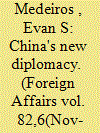

|
|
|
| 3 |
ID:
109480
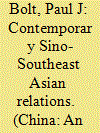

|
|
|
|
|
| Publication |
2011.
|
| Summary/Abstract |
China's growth has brought important benefits to Southeast Asia. China's "new diplomacy" has accommodated many of the region's political concerns and its economic expansion has been an engine of growth for Southeast Asia. However, China's rise brings challenges as well. China's rapid naval build-up, more intensified disputes in the South China Sea, environmental problems and questions over China's ultimate goals create concerns in the region. Southeast Asia's strategy has been to accommodate China's rise while striving to maintain the American position in the region. Southeast Asia has been successful in this strategy, although this balance will be increasingly difficult as China's power increases.
|
|
|
|
|
|
|
|
|
|
|
|
|
|
|
|
| 4 |
ID:
147689
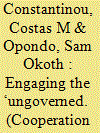

|
|
|
|
|
| Summary/Abstract |
This article explores biopolitical practices that extend beyond national borders and take the whole of humanity as their province. It looks at how attempts to secure and optimize conditions of living in Africa are not merely governmental in scope but also diplomatic in their conceptualization and conduct. It specifically examines the merging of diplomacy, defence and development (or the 3Ds), which purports to optimize life and shape ways of being in areas that cannot be ‘fully governed’ or resist domestication. It assesses the impact of diplomatic pluralization, characterized by the militarization of diplomacy and development, the diplomatization of the military, and new forms of diplomatic outreach, as practised by agencies such as AFRICOM. At stake in this exploration is an ethico-political critique of 3D engagement through which lives, conducts and relationships are negotiated in the postcolony.
|
|
|
|
|
|
|
|
|
|
|
|
|
|
|
|
| 5 |
ID:
159163
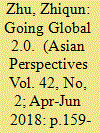

|
|
|
|
|
| Summary/Abstract |
From 1978 to roughly 1990, China focused on “bringing in” foreign direct investment. After 1990 it began “going out” in earnest as part of its new diplomacy. Between 1990 and 2005, China's outbound investment was concentrated in the developing world. Since 2005, China has expanded its overseas investment to the developed world, and in recent years such activities have accelerated. This qualitative transformation of China's global business expansion is taking place as China is poised to overtake the United States to become the world's largest economy. What explains China's new wave of global investment? How will it affect international political economy? What challenges do China's businesses face in the West? Through empirical analysis, this study examines the rationale, strategies, and impact of China's growing investment in the West.
|
|
|
|
|
|
|
|
|
|
|
|
|
|
|
|
| 6 |
ID:
065726
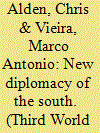

|
|
|
| 7 |
ID:
076284
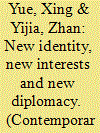

|
|
|